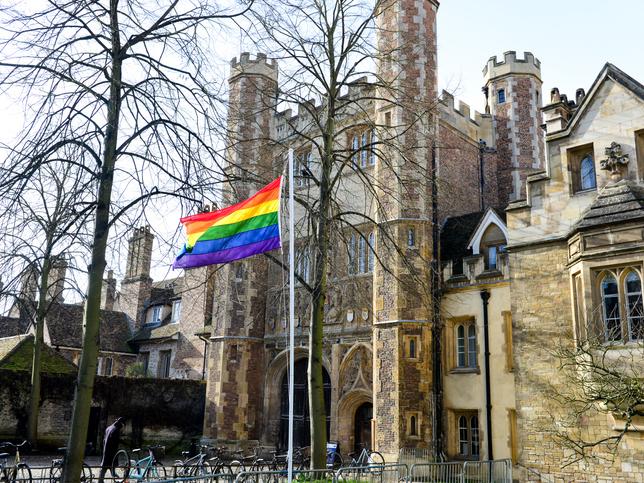
Supporting LGBTQ+ aspiring leaders in universities
LGBTQ+ staff bring to campus qualities such as courage and sensitivity that are key to leadership. Now a UK programme aims to develop those strengths in future academic and professional services leaders

It is often said that we can’t be what we can’t see. Despite the growing diversity in our universities’ student and staff populations, in the most senior leadership roles the white, cis, heterosexual male endures. Thankfully, there is the welcome emergence of national leadership development programmes for women and people of colour but, at present, no equivalent programme for aspiring LGBTQ+ university leaders.
In 2022, as co-leads of our LGBTQ+ staff network, we piloted the UK’s first LGBTQ+ leadership development programme for academic and professional services staff at Anglia Ruskin University. Here, we describe why and how we did this and why the lived experience of LGBTQ+ colleagues may make them ideally placed for leadership.
Why run a leadership programme for LGBTQ+ staff?
The university workplace experience for those with protected characteristics or non-traditional backgrounds is far from straightforward. Kate Carruthers-Thomas, a senior research fellow at Birmingham City University, found in 2019 that LGBTQ+ staff in universities perceived a glass closet, similar to the glass ceiling acknowledged as adversely affecting women’s career development.
- Leadership and the intersectionality of being queer and living with HIV
- Spotlight: Embracing diversity in higher education
- How to tell if your university is making a genuine effort to increase diversity
Evidence suggests that LGBTQ+ people experience their workplaces in distinct ways and so begin their leadership journeys from a different starting place to their heterosexual and cis-gendered peers. It is important to note, however, we do not suggest LGBTQ+ colleagues are inherently different from their heterosexual or cis peers; rather, that in managing the intersection of their personal and professional identities in the workplace, they practise behaviours that over time equip them with a particular suite of skills.
Research supports our assertion. In The G Quotient, professor of clinical business communication Kirk Snyder identified that through adverse lived experiences, LGBTQ+ business leaders in the US embraced difference and created cultures that valued a diversity of strengths. In 2014, Thomas Christo, too, found a distinctiveness in the way that US lesbian and gay university leaders used their skills and abilities to overcome barriers, achieve goals and build a strong sense of community in their institutions.
How is our LGBTQ+ leadership programme designed?
The design and delivery of the programme draw on learning from work with LGBTQ+ aspirant school leaders. It aims to address issues facing LGBTQ+ staff in universities and exploit the possible skills acquired through navigating these challenges. Over the course of an academic year, participants attend three face-to-face leadership development days. In between these days, using John Whitmore’s Grow model, they work one on one with a mentor who identifies as LGBTQ+ and is an experienced leader in higher education. Areas covered in the development days include:
- theories of leadership and leadership self-assessment activities
- identification of promotion opportunities and career planning
- building confidence in presentation skills and public speaking with a coach from the Royal Academy of Dramatic Art
- development of coaching skills to develop others
- networking and confidence-building activities to promote peer support.
Why might LGBTQ+ colleagues make effective leaders in higher education?
From our leadership development work with our LGBTQ+ university colleagues, we have identified that they may practise behaviours that over time develop five distinct leadership attributes.
Sensitivity to the inclusion of others
LGBTQ+ colleagues have often felt marginalised or othered during their own education, within their families or communities. As a result, these individuals are more likely to be sensitive to inclusive practice and have heightened awareness of those on the margins. This may equip them with a strong sense of social justice and an abundance of empathy for students and colleagues marginalised on the basis of other protected characteristics. This ability to recognise and champion those who are othered is key to creating an inclusive culture for staff and students.
Connecting with others
LGBTQ+ people spend most of their time in hetero- and cis-normative spaces. Through necessity, they become skilful at identifying where it is possible to connect with others with whom they may not naturally have much in common. Such skills are invaluable for university leaders when developing teams and building trust across their higher education community.
Where LGBTQ+ leaders are able to come out to colleagues, they are likely to form closer working relationships and elicit greater levels of trust from their staff. When an LGBTQ+ university leader is able to come out, it gives those who work for them permission to do the same. This sharing of the personal in the professional environment helps encourage authenticity. We are all most effective in the workplace when we are able to be ourselves.
Emotional intelligence
LGBTQ+ colleagues often need to develop excellent emotional intelligence as a means of protecting themselves from exposure to prejudice. They have highly developed instincts when meeting people for the first time, especially when calculating whether it is safe to come out. They are potentially very discerning when identifying people’s intentions, making astute decisions, appointing employees and negotiating with partners and stakeholders.
Managing uncertainty and stressful situations
LGBTQ+ people are used to tolerating ambiguity. For example, they often suppress uncertainty around how accepting others are about their LGBTQ+ identity. This is a constant source of workplace anxiety that they must manage without it distracting from their performance. University leaders must sometimes protect their communities from uncertainty or adversity, and LGBTQ+ colleagues often have extensive experience in operating effectively under personal stress while betraying nothing in their professional demeanour. This skill is key to demonstrating strong leadership and ensuring that followers are not unduly troubled or stressed.
Courage and risk-taking
When LGBTQ+ colleagues apply for positions, they must calculate whether or not their new university workplace will provide the space and time for them to speak their sexual or gender identity into existence. All too often, a culture of “don’t ask, don’t tell” prevails – a heterosexist pseudo-tolerance that denies LGBTQ+ people the opportunity to be themselves. It takes courage for an LGBTQ+ person to present themselves authentically within a new workplace, and this hones in LGBTQ+ aspiring leaders good judgement around risk. Courage and the management of risk are essential leadership skills in higher education and are needed to navigate a whole host of priorities.
Potential future development
This pilot project in our own university has been received positively by participants and we aim to develop it further.
When LGBTQ+ leaders become visible within universities, they embody a distinct type of leadership through the application of the five attributes identified. Their visibility encourages other LGBTQ+ staff and students to be their authentic selves, which in turn helps promote inclusive university communities.
Catherine Lee is deputy dean (education) and Daniel Burman is business operations manager at Anglia Ruskin University; both are co-leads of ARU’s LGBTQ+ network.
If you found this interesting and want advice and insight from academics and university staff delivered direct to your inbox each week, sign up for the THE Campus newsletter.


